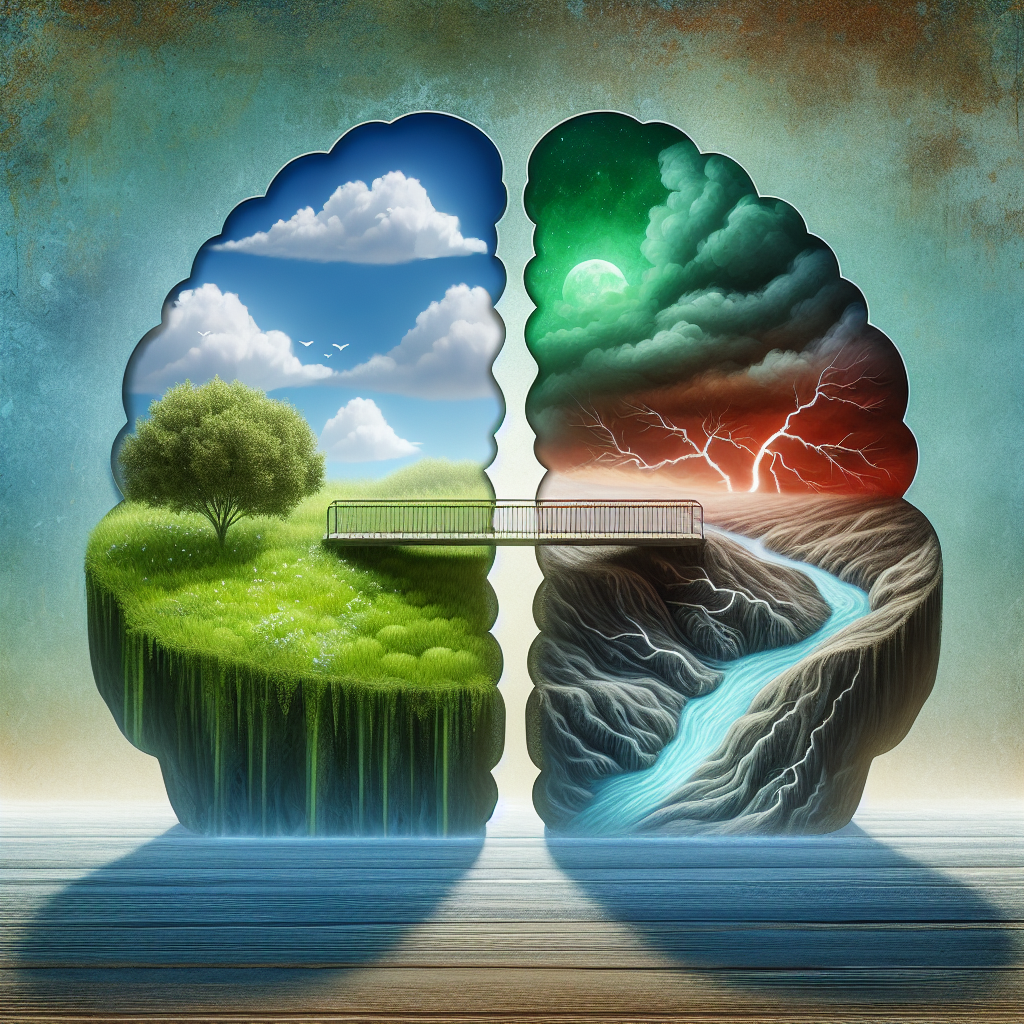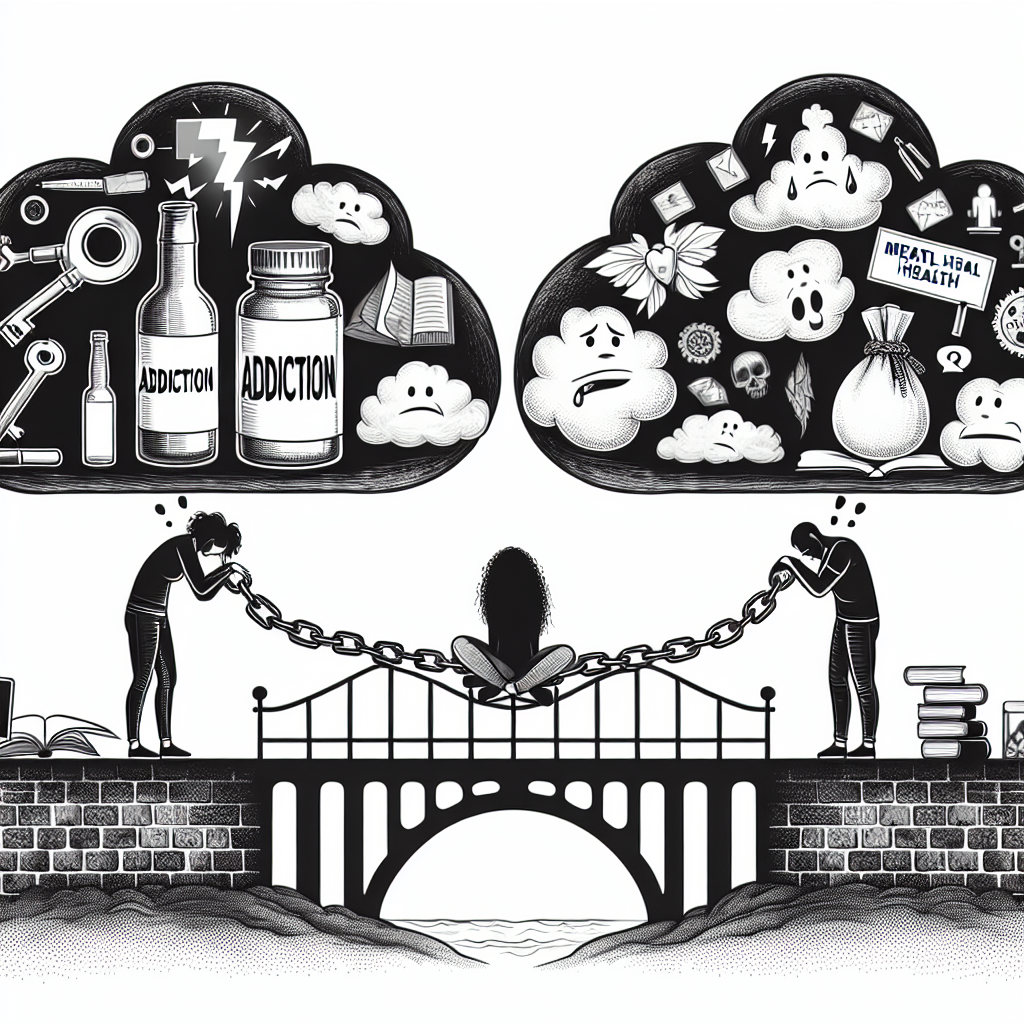-
Table of Contents

“Unraveling the Link: Bridging Addiction and Mental Health for a Brighter Tomorrow”
Introduction
Understanding the connection between addiction and mental health is crucial for developing effective treatment strategies and fostering a comprehensive approach to recovery. Addiction, whether to substances or behaviors, often coexists with mental health disorders, creating a complex interplay that can exacerbate both conditions. This dual diagnosis, or co-occurring disorder, requires an integrated treatment plan that addresses both the addiction and the underlying mental health issues. By exploring the biological, psychological, and social factors that link addiction and mental health, we can better understand the challenges faced by individuals and improve the support systems available to them. This holistic perspective is essential for promoting long-term recovery and enhancing overall well-being.
Exploring the Link Between Substance Abuse and Mental Health Disorders
The intricate relationship between addiction and mental health is a subject of growing interest and concern among healthcare professionals, researchers, and the general public. Understanding this connection is crucial for developing effective treatment strategies and fostering a more compassionate approach to those struggling with these intertwined issues. As we delve into the link between substance abuse and mental health disorders, it becomes evident that these conditions often coexist, creating a complex web that can be challenging to untangle.
To begin with, it is essential to recognize that addiction and mental health disorders frequently occur together, a phenomenon known as comorbidity. Studies have shown that individuals with mental health disorders are more likely to develop substance abuse problems, and vice versa. This bidirectional relationship suggests that one condition can exacerbate the other, leading to a vicious cycle that is difficult to break. For instance, someone suffering from depression may turn to alcohol or drugs as a form of self-medication, seeking temporary relief from their emotional pain. However, this can lead to dependency and further deterioration of their mental health, creating a downward spiral that is hard to escape.
Moreover, the underlying causes of both addiction and mental health disorders often overlap. Genetic predisposition, environmental factors, and traumatic experiences can all contribute to the development of these conditions. For example, a person with a family history of addiction may be more susceptible to substance abuse, while also being at higher risk for mental health issues such as anxiety or depression. Additionally, exposure to stressful or traumatic events, such as childhood abuse or neglect, can increase the likelihood of both addiction and mental health disorders. This shared etiology underscores the importance of addressing the root causes of these conditions in a holistic manner.
Transitioning to the impact of these co-occurring disorders, it is clear that the presence of both addiction and mental health issues can complicate the treatment process. Traditional approaches that focus solely on one condition may be insufficient, as they fail to address the interconnected nature of these problems. Integrated treatment models, which simultaneously address both substance abuse and mental health disorders, have shown promise in improving outcomes for individuals with comorbid conditions. By providing comprehensive care that encompasses medical, psychological, and social support, these integrated approaches can help individuals achieve lasting recovery and improved quality of life.
Furthermore, it is important to highlight the role of stigma in perpetuating the challenges faced by those with co-occurring disorders. Societal attitudes towards addiction and mental health can create barriers to seeking help, as individuals may fear judgment or discrimination. By fostering a more compassionate and understanding perspective, we can encourage those struggling with these issues to seek the support they need. Education and awareness campaigns can play a vital role in changing perceptions and reducing the stigma associated with addiction and mental health disorders.
In conclusion, exploring the link between substance abuse and mental health disorders reveals a complex and multifaceted relationship that requires a nuanced and compassionate approach. By recognizing the interconnected nature of these conditions, addressing their shared underlying causes, and promoting integrated treatment models, we can make significant strides in supporting individuals on their journey to recovery. Additionally, by challenging societal stigma and fostering a more empathetic understanding, we can create an environment where those affected by addiction and mental health issues feel empowered to seek help and achieve lasting well-being.
How Co-Occurring Disorders Impact Recovery and Treatment Strategies
Understanding the connection between addiction and mental health is crucial for developing effective recovery and treatment strategies. Co-occurring disorders, also known as dual diagnosis, refer to the simultaneous presence of a mental health disorder and a substance use disorder in an individual. This complex interplay between addiction and mental health can significantly impact the recovery process, making it essential to address both issues concurrently for successful treatment outcomes.
One of the primary challenges in treating co-occurring disorders is the intricate relationship between the two conditions. Mental health disorders such as depression, anxiety, bipolar disorder, and post-traumatic stress disorder (PTSD) can often lead individuals to self-medicate with drugs or alcohol in an attempt to alleviate their symptoms. Conversely, substance abuse can exacerbate or even trigger the onset of mental health issues, creating a vicious cycle that is difficult to break. Therefore, understanding this bidirectional relationship is key to developing comprehensive treatment plans that address the root causes of both disorders.
Integrated treatment approaches have emerged as a promising solution for individuals with co-occurring disorders. These approaches involve the simultaneous treatment of both addiction and mental health issues, rather than addressing them separately. By adopting an integrated approach, healthcare providers can offer a more holistic and personalized treatment plan that considers the unique needs of each individual. This can include a combination of medication management, psychotherapy, behavioral therapies, and support groups, all tailored to address both the substance use disorder and the mental health condition.
Moreover, the importance of early intervention cannot be overstated. Identifying and addressing co-occurring disorders at an early stage can significantly improve the chances of successful recovery. Early intervention allows for the implementation of appropriate treatment strategies before the disorders become more entrenched and harder to treat. This proactive approach can help prevent the escalation of symptoms and reduce the risk of relapse, ultimately leading to better long-term outcomes.
Another critical aspect of treating co-occurring disorders is the need for a supportive and understanding environment. Stigma and discrimination associated with both addiction and mental health issues can create significant barriers to seeking help. Encouraging a culture of empathy and acceptance can make a profound difference in the lives of those struggling with these conditions. Support from family, friends, and the community can provide the necessary encouragement and motivation for individuals to engage in treatment and stay committed to their recovery journey.
Furthermore, ongoing support and aftercare are essential components of a successful recovery plan. Recovery from co-occurring disorders is a long-term process that requires continuous effort and dedication. Aftercare programs, such as sober living homes, outpatient therapy, and peer support groups, can provide the necessary structure and support to help individuals maintain their sobriety and mental well-being. These programs offer a safe space for individuals to share their experiences, learn coping strategies, and build a strong support network that can help them navigate the challenges of recovery.
In conclusion, understanding the connection between addiction and mental health is vital for developing effective recovery and treatment strategies for co-occurring disorders. By adopting integrated treatment approaches, emphasizing early intervention, fostering a supportive environment, and providing ongoing support, we can significantly improve the chances of successful recovery for individuals struggling with these complex conditions. Through compassion, understanding, and comprehensive care, we can inspire hope and empower individuals to reclaim their lives from the grips of addiction and mental health challenges.
Q&A
1. **Question:** How does addiction impact mental health?
**Answer:** Addiction can exacerbate existing mental health conditions, such as depression and anxiety, and can also lead to the development of new mental health issues due to the changes in brain chemistry and the stress of maintaining the addiction.
2. **Question:** What is the role of dual diagnosis in treating addiction and mental health disorders?
**Answer:** Dual diagnosis refers to the simultaneous treatment of both addiction and co-occurring mental health disorders, recognizing that addressing both issues concurrently is essential for effective recovery and reducing the risk of relapse.
Conclusion
Understanding the connection between addiction and mental health is crucial for effective treatment and recovery. Both conditions often coexist, influencing and exacerbating each other. Recognizing this interplay allows for integrated treatment approaches that address both issues simultaneously, improving outcomes for individuals. Comprehensive care that includes medical, psychological, and social support is essential for addressing the complex needs of those affected by both addiction and mental health disorders.



